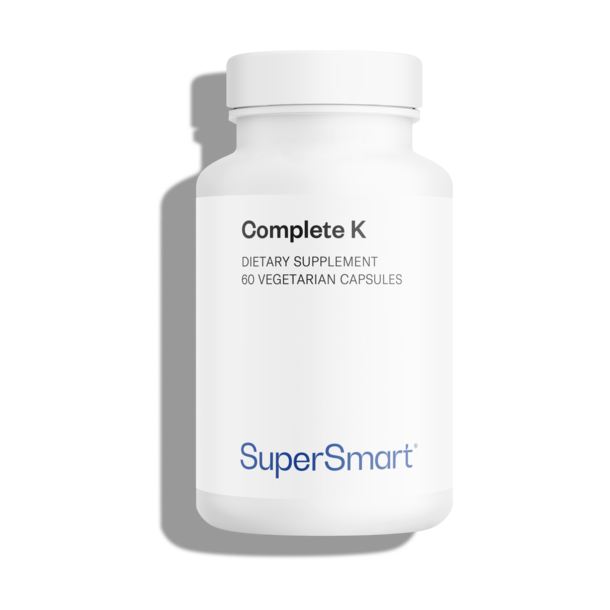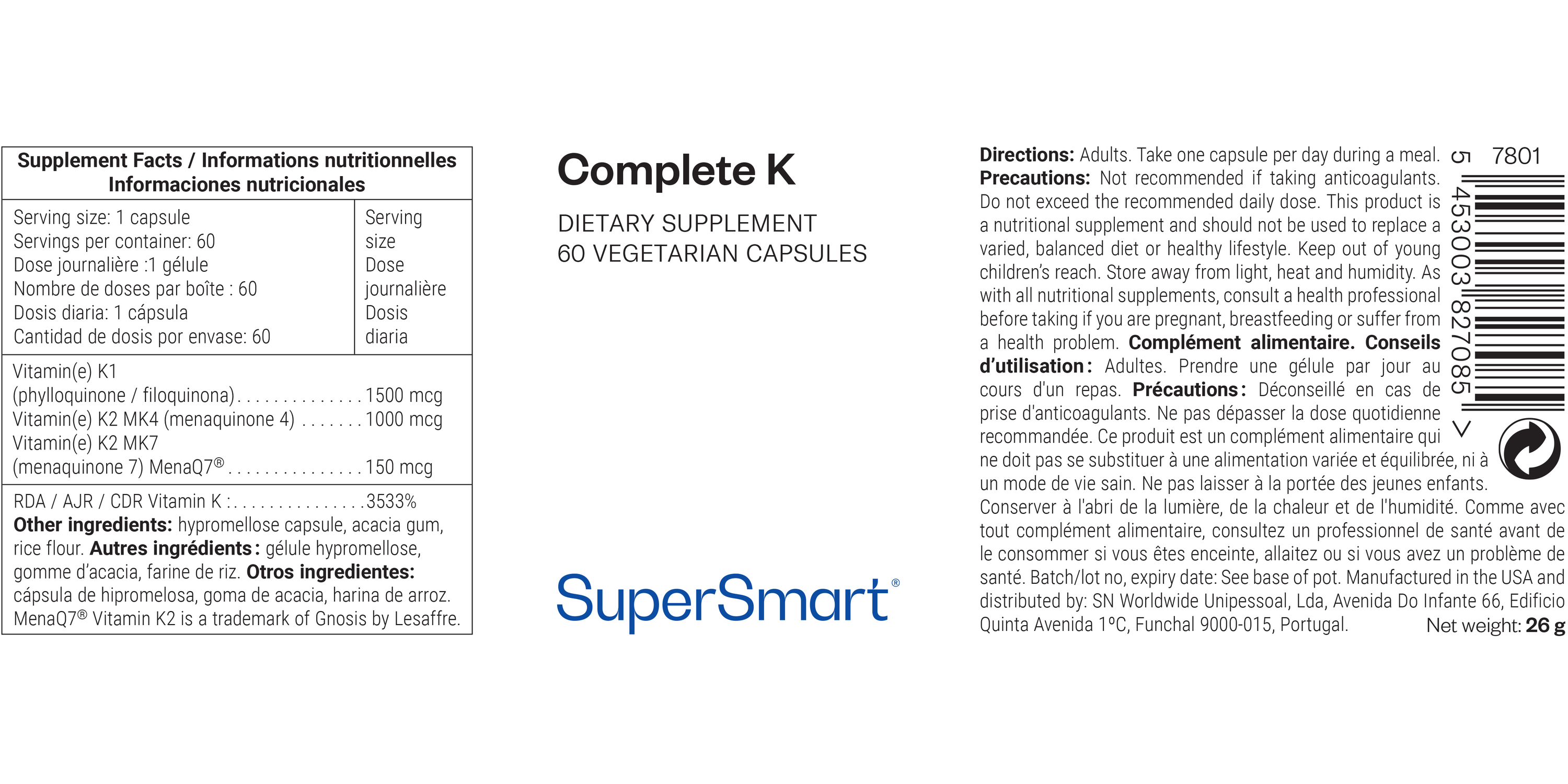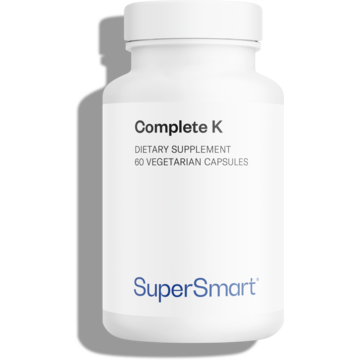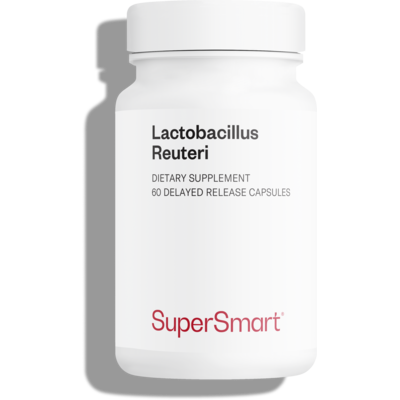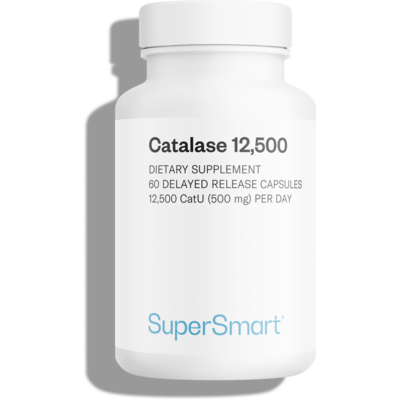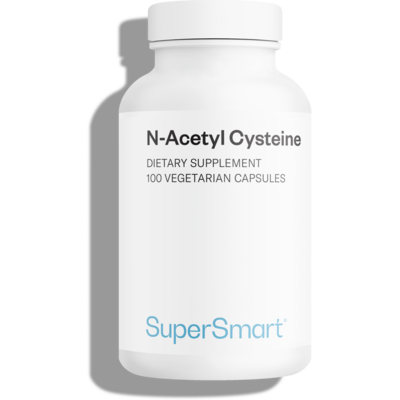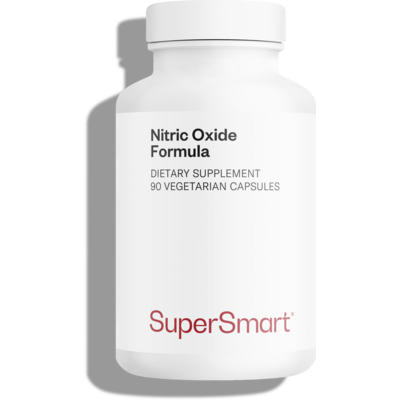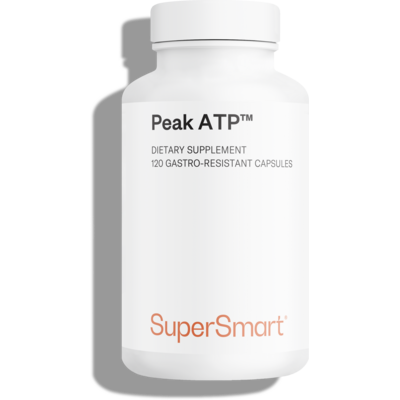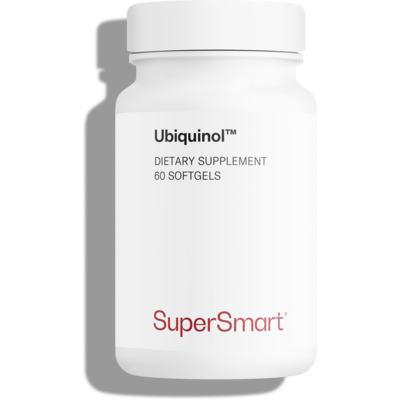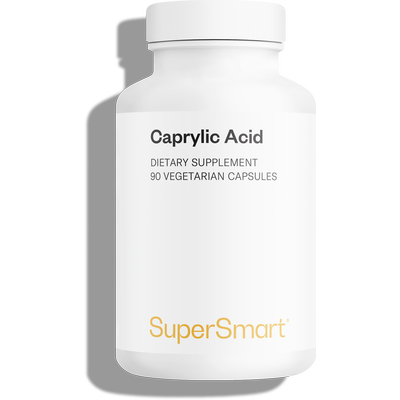Create Your Offer
Complete K encapsulates vitamins K1, K2 MK-4, and K2 MK-7, ensuring optimal delivery in vegetarian capsules. This Vitamin K supplement is now available to buy at SuperSmart.
Who Should Take Vitamin K Capsules?
The term Vitamin K covers various substances that play a part in activating certain coagulation – or koagulation, in German – factors. Once it reaches the lymphatic vessels, Vitamin K is taken up by chylomicrons and accumulates in the liver, where it synthesizes four coagulation factors, including factor II (prothrombin) and its conversion into thrombin.
Having said that, research by Dr. Rhéaume-Bleue has revealed that 80% of Americans are deficient in Vitamin K2, which can potentially lead to health issues. If you fall into any of the following categories, taking Complete K could be especially beneficial for those who:
- Are at risk of bleeding;
- Have an intestinal malabsorption disease (Crohn's or celiac disease, chronic diarrhea, among others);
- Are older;
- Are at risk of developing osteoporosis;
- Are going through menopause;
Vitamin K is also vital for newborn babies, which is why many pregnant women take a Vitamin K supplement during pregnancy and why healthcare professionals often recommend organic Vitamin K supplements for breastfeeding mothers.
Vitamin K also supports strong muscles and bones, which is why many people take Vitamin K supplements for bruising and even take OTC Vitamin K supplements for osteoporosis prevention.
Besides the groups who fall under all those Vitamin K capsules uses, scientists at Maastricht University found that many healthy people are not receiving the recommended daily intake of Vitamin K and that supplementation may benefit anyone over 40.
Why Should You Buy Vitamin K Supplements?
It is now known that a Vitamin K2 supplement remains active for a long time in the body (up to 3 days) at very low doses while being ten times more bioavailable than a Vitamin K1 supplement. It also acts synergistically with a number of nutrients, such as Vitamin E and calcium. However, there are even more biological benefits of Vitamin K2. Here are a few other Vitamin K capsule benefits:
- It moves calcium into tissues, bones, and teeth, where it is needed. When activating the synthesis of osteocalcin, a specific hormone of bone tissue produced by osteoblasts, it ensures mineralization by capturing and redistributing calcium within the body to the bones and teeth.
- It reduces osteoporosis-related bone fractures – particularly broken hips.
- Conversely, it removes calcium from parts of the body where it should not be, such as the arteries and soft tissues, where it can cause hardening.
- By doing so, it protects such tissues from potential hardening in the form of atherosclerosis and aortic calcification.
- Finally, it supports the healthy functioning of the renal system by preventing calcium-type kidney stones.
- A study published in the journal 'Modern Rheumatology' has also shown that Vitamin K2 may improve symptoms of rheumatoid arthritis. At the same time, other research suggests it can help maintain normal ATP production in mitochondrial dysfunction such as that related to Parkinson's disease.
The health benefits of OTC Vitamin K supplements speak for themselves. However, even more, specific Vitamin K capsules benefit skin health.
What do Studies Show About Vitamin K?
Up until the past few years, it was thought there was only one form and one active family of Vitamin K, represented by Vitamin K1. Vitamin K1 is found primarily in plants and cruciferous green vegetables, such as cabbage, parsley, spinach, and lettuce. It is fat-soluble and heat-stable but sensitive to light and environments with high pH.
The other form of Vitamin K, Vitamin K2, is divided into two forms: menaquinone-4 (MK-4) and menaquinone-7 (MK-7). Vitamin K2 MK-7 supplements and Vitamin K2 MK-4 supplements have recently been the subject of important studies highlighting several new properties.
The MK-4 form of Vitamin K2 is very similar to Vitamin K1. In fact, the body is capable of converting Vitamin K1 into Vitamin MK-4. However, the latter has a biological half-life of barely an hour and is therefore not a good supplement to take alone.
MK-7, on the other hand, has a half-life of three days, ensuring stable blood concentrations and enabling low doses to be taken with no cumulative effects. Natto is one of the primary sources for extraction.
According to the latest studies, MK-7 is proving to be one of the best preventive agents against chronic inflammation, which, over the years, can silently damage tissues and contribute to the development of health conditions. Studies have shown it inhibits pro-inflammatory markers produced by monocytes.
Menaquinones (Vitamin K2) are synthesized by bacteria in the intestinal tract, but they are unfortunately totally eliminated in feces rather than distributed to vessels, bones, and various tissues.
K2 vitamins are also found in offal, meat, fermented products including specific cheeses, and especially natto – a traditional Japanese food made from soybeans through fermentation. Despite being the richest source of Vitamin K2, natto is unfortunately not a part of most Western daily diets.
There is also a synthetic form, Vitamin K3 (menadione), but it is rarely used since it interferes with cells' antioxidant defenses and can cause oxidation of cell membranes. In babies, it can destroy red blood cells, leading to anemia. Those looking to supplement with Vitamin K should do so with K1 and K2 forms.
WARNINGS
Do not exceed the recommended daily dose. This product is a nutritional supplement and should not be used as a substitute for a varied and balanced diet or a healthy lifestyle.
STORAGE
Store in a cool, dry place away from direct sunlight, heat, and humidity. Keep out of reach of children.
PREGNANCY AND MEDICAL CONDITIONS
If you are pregnant, breastfeeding, or have any medical conditions, consult your healthcare provider before using this product.
SUPPLEMENT INTERACTIONS
Consult your healthcare provider before use, especially if you are taking any medications or other supplements as there may be potential interactions.
Need Help?
Phone Number
+1 (786) 522-3907
From 9 am to 6 pm (EST)

